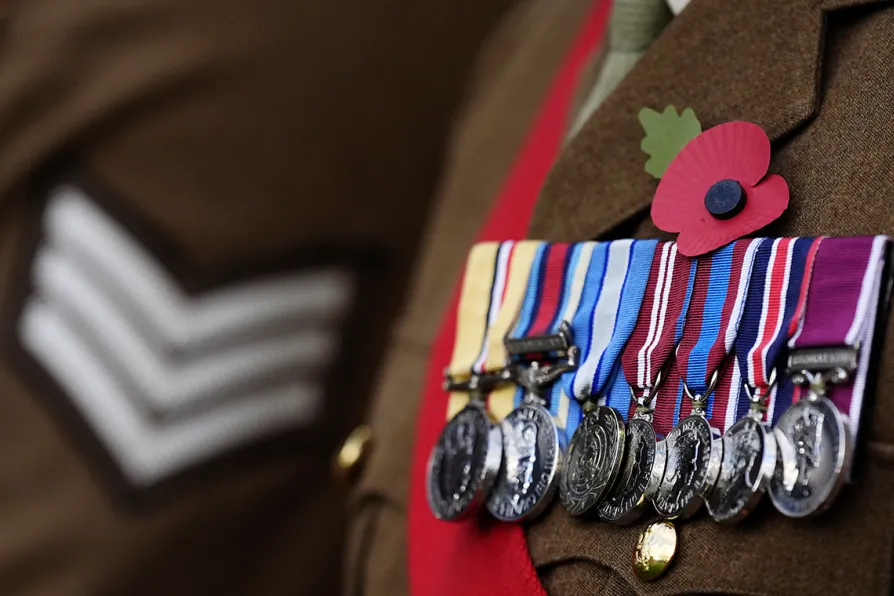
 War medals to mark Remembrance Sunday ahead of the Championship match at Stoke City Stadium, Stoke-on-Trent. Picture date: Saturday November 8, 2025.
War medals to mark Remembrance Sunday ahead of the Championship match at Stoke City Stadium, Stoke-on-Trent. Picture date: Saturday November 8, 2025.
EVER since we began marking Remembrance Sunday it has been contested territory.
Its date, the closest Sunday to Armistice Day, and its symbol — the red poppy that flourished on Flanders fields — show its origins in the aftermath of the first world war.
The “war to end all wars” was known as such because the unprecedented industrial slaughter of 1914-18 created a powerful “never again” sentiment.
The popular memory of World War I is still shaped by the understanding that its victims were ordinary people sent to die in the interests of their masters: the legacy of outspoken veterans like the last survivor of the trenches, Harry Patch, who called it “legalised mass murder;” of the war poets like Wilfred Owen and Siegfried Sassoon; even of popular comedies like Blackadder Goes Forth.
For ruling classes this anti-war sentiment has always been an existential threat. World War I itself ended in revolution, in Russia where the cry of “peace, bread, land” threatened to end capitalism once and for all; in Germany where a people in revolt, not the Allied armies, toppled the Kaiser.
So from the beginning Remembrance Sunday has been manipulated by the powerful to honour war itself, not those who die in it.
Many still wear the red poppy to remember the dead, but the political narrative around the poppy is one of loyalty to militarism: hence the furore when a public figure does not don a poppy in the run-up to Armistice Day.
Or, ironically, when anyone with an anti-war record does. Some of the most absurd attacks on Jeremy Corbyn when he led Labour concerned his attendance at Cenotaph ceremonies, while this month left MP Zarah Sultana received social media abuse for wearing a poppy (someone of her political views and, it was not so subtly hinted, her skin colour, having “no right” to).
The misuse of soldiers’ memory to glorify war was expressed in its purest form by the Daily Telegraph lately in an article entitled “Hail the glorious dead: not only for being ready to die but to kill,” penned by the reliably bloodthirsty Hamish de Bretton-Gordon. “Statistically, most of them took at least one of the enemy with them when they went,” he gloats.
The deaths of which “enemies” do we celebrate here? Aside from World War II — which as a people’s war against fascism rather than a predatory adventure to enrich Britain’s rulers is unique in our history — they have been luckless victims of their own rulers’ imperialist greed (as in World War I), people defending their countries against British aggression (as in Iraq or Libya) or fighting to liberate themselves against British-abetted oppression (in Malaya or Korea) — or, overwhelmingly, non-combatant victims of war, one reason support for the white poppy honouring all war victims is on the increase.
The celebration of killing supposed “enemies” serves to soften us up for future wars against countries we are told to fear. In a new era of great power conflict, with Britain tied by Nato to a United States determined to maintain its supremacy by force, this is disastrous.
But the war propagandists do not have it all their way. The Palestine solidarity movement in particular not only mobilises mass opposition to war, but alerts millions to the reality that British military power is deployed in aid of oppression and genocide, not democracy or human rights.
That movement has created the context in which a new party of the left announced by Corbyn and Sultana holds its founding conference later this month. It is an opportunity to build anti-imperialism into a major force in British politics, to oppose rearmament and to break the taboo against questioning Nato membership and the poisonous alliance with Washington.
Doing so is a better tribute to the fallen than that offered by belligerent politicians ready to send more generations off to war.










